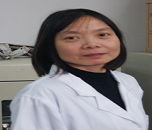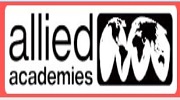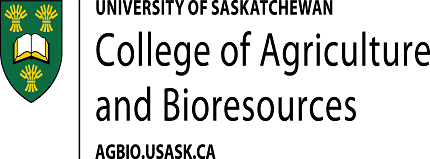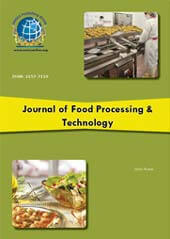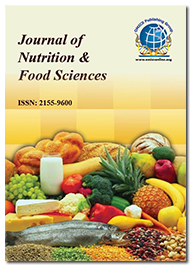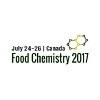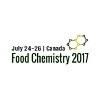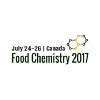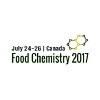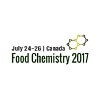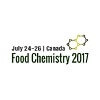Theme: Where Food Meets Science: Exploring Recent Advances in Food Research and Business
Food Chemistry 2017
Take advantage of three days’ worth of intensive presentations in over 50 sessions offering a comprehensive selection of topics. You’ll learn from leading experts--and a collection of your peers. The Food Chemistry 2017 conference program is organized across dynamic conference tracks designed to help you focus on research and issues that are most important to you.
Food Chemistry 2017 Annual Conference will offer 16 panel tracks, providing you with plenty of choices where you can submit your proposal. They are:
Track 1: Chemistry of Food
Food chemistry is the study of the chemical composition, processes and interactions of all biological and non-biological components of foods. It includes macro- and micronutrients, and the essential nutritional factors that determine the nutritional and energy value of food raw materials and foods. It also includes reactions related to amino acids, peptides and proteins, fats and other lipids, carbohydrates, vitamins, mineral substances and water which are responsible for odour, taste and colour that determine the quality of food materials and foods.
Related: Food Conferences in USA | Food science Conferences in America| Nutrition Conferences| Food Chemistry Conferences | Chemistry Conferences |ConferenceSeries Ltd
Topics to be covered:
· Food and Fruit Chemistry
· Food Biochemistry
· Impact of Chemicals on Food Supply and Quality
· Food Composition
· Food Allergy and Anaphylaxis
· Pigments in Foods
· Aroma Compounds
· Maillard Reactions
Related societies, associations and agencies:
World Apple and Pear Association, Belgium; Wisconsin Restaurant Association Education Foundation, Wisconsin; Wisconsin Restaurant Association, Wisconsin;United States Department of Agriculture (USDA), USA; United States Brewers' Association, USA;UK Government Decontamination Service, UK; U.S. Poultry & Egg Association, USA
Track 2: Food and Nutrition
Nutrition is the science that interprets the interaction of nutrients and other substances in food (e.g. phytonutrients, anthocyanins, tannins, etc.) in relation to maintenance, growth, reproduction, health and disease of an organism. It includes food intake, absorption, assimilation, biosynthesis, catabolism and excretion. The diet of an organism is what it eats, which is largely determined by the availability, processing and palatability of foods. A healthy diet includes preparation of food and storage methods that preserve nutrients from oxidation, heat or leaching, and that reduce risk of food-borne illnesses. A poor diet may have an injurious impact on health, causing deficiency diseases such as blindness, anaemia, scurvy, preterm birth, stillbirth and cretinism; health-threatening conditions like obesity and metabolic syndrome; and such common chronic systemic diseases as cardiovascular disease, diabetes, and osteoporosis.
Related: Food Conferences in USA | Food science Conferences in America| Nutrition Conferences| Food Chemistry Conferences | Chemistry Conferences |ConferenceSeries Ltd
Topics to be covered:
· Nutrient Bioavailability
· Food Science of Animal Resources
· Carbohydrates Structure and Interactions with Water and Proteins
· Lipids Structures and Interactions with Water and Food Proteins
· Food Protein Denaturation
· Interaction of Salts and Minerals with Food Proteins and Water
· Vitamins and Minerals
· Role of Food and Nutrition in Health
· Divergence and Convergence in Nutrition Science
· Metabolomics of Carotenoids: The Challenges and Prospects
· Food Choice and Consumer Behavior
Related societies, associations and agencies:
The Washington Restaurant Association, USA; Netherlands Nutrition Centre, Netherlands; Specialty Wine Retailers Association, USA; Specialty Food Association, USA; Specialty Coffee Association of Indonesia, Indonesia; Southern Hemisphere Association of Fresh Fruit Exporters, Belgium
Track 3: Human Nutrition
Human nutrition is a progressive, multi-disciplinary science requiring knowledge ranging from nutrient supply and metabolic processing by the body to psychosocial and behavioural factors influencing diet.
Related: Food Conferences in USA | Food science Conferences in America| Nutrition Conferences| Food Chemistry Conferences | Chemistry Conferences |ConferenceSeries Ltd
Topics to be covered:
Nutrition and metabolism
Maternal, child and adolescent nutrition
Food choice
Adult nutrition
Human lifecycle physiology
Sport nutrition
Related societies, associations and agencies:
Cornish Pasty Association; Committee on the Environment, Public Health and Food Safety (EU); Catalan Food Safety Agency, USA; Canadian Restaurant and Foodservices Association, Canada
Track 4: Food Security
Food security is defined as the availability of food and one's access to it. A household is considered food secure when its occupants do not live in hunger or fear of starvation. Stages of food insecurity range from food secure situations to full-scale famine.
Related: Food Conferences in USA | Food science Conferences in America| Nutrition Conferences| Food Chemistry Conferences | Chemistry Conferences |ConferenceSeries Ltd
Topics to be covered:
· Climate impacts and adaptation
· Data science for food security
· Tropical oil crops
· Water resources
· Nutrition and food security
· Food cost and inflation
Related societies, associations and agencies:
Scotland Food & Drink, Scotland; SAFE FOODS, USA; Produce Marketing Association, Europe;Processed Vegetable Growers' Association, Australia; Potato Council, USA; Norwegian Ministry of Agriculture and Food Landbruks, Norwegian; Norwegian Food Safety Authority Mattilsynet, Norwegian
Track 5: Livestock Nutrition
The study of nutrition processes, as well as the components of food, their actions, interaction, and balance in relation to health and disease in animals.
Related: Food Conferences in USA | Food science Conferences in America| Nutrition Conferences| Food Chemistry Conferences | Chemistry Conferences |ConferenceSeries Ltd
Topics to be covered:
Animal and its food
Nutrient requirements of animals
Nutritional characteristics of foods
Animal products and human nutrition
Related societies, associations and agencies:
World Apple and Pear Association, Belgium; Wisconsin Restaurant Association Education Foundation, Wisconsin; Wisconsin Restaurant Association, Wisconsin; United States Brewers' Association, USA; UK Government Decontamination Service, UK; U.S. Poultry & Egg Association, USA
Track 6: Food safety
Food safety is about handling, storing and preparing food to prevent infection and help to make sure that our food keeps enough nutrients for us to have a healthy diet.
Related: Food Conferences in USA | Food science Conferences in America| Nutrition Conferences| Food Chemistry Conferences | Chemistry Conferences |ConferenceSeries Ltd
Topics to be covered:
Food safety and quality
Food safety policy
Safe food handling
Food safety regulations and standards
Foodborne Illness and Food Safety
Food recalls, risks and outbreaks
Related societies, associations and agencies:
The Washington Restaurant Association, USA; Netherlands Nutrition Centre, Netherlands; Specialty Wine Retailers Association, USA; Specialty Food Association, USA; Specialty Coffee Association of Indonesia, Indonesia; Southern Hemisphere Association of Fresh Fruit Exporters
Track 7: Food Science and Technology
Food science draws from many disciplines such as biology, chemical engineering, and biochemistry in an attempt to better understand food processes and ultimately improve food products for the general public. As the stewards of the field, food scientists study the physical, microbiological, and chemical makeup of food. By applying their findings, they are responsible for developing the safe, nutritious foods and innovative packaging that line supermarket shelves everywhere.
The food you consume on a daily basis is the result of extensive food research, a systematic investigation into a variety of foods’ properties and compositions. After the initial stages of research and development comes the mass production of food products using principles of food technology. All of these interrelated fields contribute to the food industry – the largest manufacturing industry in the United States.
Related: Food Conferences in USA | Food science Conferences in America| Nutrition Conferences| Food Chemistry Conferences | Chemistry Conferences |ConferenceSeries Ltd
Topics to be covered:
· Food Ingredient Technology
· Human Sensory Systems and Food Evaluation
· Postharvest Technology of Fruit & Vegetables
· Water-Solid Interactions
· Advanced Analytical Techniques in Agriculture
· Food Lipids
· Food Proteins
· Developments in food technology
· Food grading
· Biological and Food Process Design
Related societies, associations and agencies:
Scotland Food & Drink, Scotland; SAFE FOODS, USA; Produce Marketing Association, Europe;Processed Vegetable Growers' Association, Australia; Potato Council, USA; Norwegian Ministry of Agriculture and Food Landbruks, Norwegian; Norwegian Food Safety Authority Mattilsynet, Norwegian
Track 8: Functionality and Behaviour of Hydrocolloids
Hydrocolloids or gums are a diverse group of long chain polymers characterized by their property of forming viscous dispersions and/or gels when dispersed in water. They produce a dispersion, which is intermediate between a true solution and a suspension, and exhibits the properties of a colloid. Considering these properties, they are appropriately termed as ‘hydrophilic colloids’ or ‘hydrocolloids’. Hydrocolloids have a wide array of functional properties in foods including thickening, gelling, emulsifying, stabilization, coating and etc.. The primary reason behind the ample use of hydrocolloids in foods is their ability to modify the rheology of food systems. This includes two basic properties of food systems that is, flow behaviour (viscosity) and mechanical solid property (texture). The modification of texture and/or viscosity of food systems help modify its sensory properties, therefore hydrocolloids are used as significant food additives to perform specific purposes.
Related: Food Conferences in USA | Food science Conferences in America| Nutrition Conferences| Food Chemistry Conferences | Chemistry Conferences |ConferenceSeries Ltd
Topics to be covered:
· Origin and Structure of Hydrocolloids
· Structural Characterization of Established Food Hydrocolloids
· Isolation Procedures, Chemical and Physicochemical Characterization
· Gelling Mechanisms
· Colloid Stability and Organoleptic Properties
· Act of Hydrocolloids during Fat and Water crystallization
· Hydrocolloids as Edible Films and Coatings
· Health Benefits of Hydrocolloids
· New sources, new materials and new technology
Related societies, associations and agencies:
Food and Drink Federation; Florida Citrus Mutual, USA; Federation of Oils, Seeds and Fats Associations, Australia; European Food Safety Authority, Europe
Track 9: Food Testing and Analysis
Analysis of food and drink is a major activity for the industry - and a very important part of product development and quality assurance. Food analysis is required for a wide variety of reasons - from testing suitability for purpose, through checking shelf-life or authenticity, to assuring legal compliance. It is important to use the correct analytical tool in order to get meaningful answers to questions.
Related: Food Conferences in USA | Food science Conferences in America| Nutrition Conferences| Food Chemistry Conferences | Chemistry Conferences |ConferenceSeries Ltd
Topics to be covered:
· Chemical and nutritional testing
· Microbiological testing
· Allergens
· Method development
· HACCP guidance & testing
Related societies, associations and agencies:
Grocery Manufacturers Association, USA; Grain and Feed Trade Association, Canada; Freshfel Europe, Europe; Food Drink Europe, Europe; Food Standards Australia New Zealand (FSANZ); Food Products Association
Track 10: Food Structure and Functionality
A food property characterizes the structure, quality, nutritional value, and/or acceptability of a food product. A food functional property is determined by physical, chemical, and/or organoleptic properties of a food. Examples of a functional property may include solubility, absorption, water retention, frothing ability, elasticity, and absorptive capacity for fats and foreign particles. Different foods have different working properties when treated in certain ways or combined with other foods.
Related: Food Conferences in USA | Food science Conferences in America| Nutrition Conferences| Food Chemistry Conferences | Chemistry Conferences |ConferenceSeries Ltd
Topics to be covered:
· Food Proteins Structure, Hydration and Functionality in Foods
· Disulfide Bond Breaking and Formation in Foods
· Structure-Functionality in Foods
· Cross-Linking in Foods
· Functionality in Complex Food Systems
· Opportunities and Challenges
· Ergometric Studies of Proteins
· Carbohydrates
· Polysaccharide Structure and Function
· Nutritional Biochemistry & Physiology
· Nutraceutical Science
· Functional Foods
Related societies, associations and agencies:
Canadian Meat Council, Canada; Canadian Cattlemen's Association, Canada; California Beer and Beverage Distributors, USA; California Avocado Society, USA; British Sandwich Association , UK; Bread Bakers Guild of America, USA; Biosecurity Australia, Australia; Australian Quarantine and Inspection Service (AQIS), Australia; Australian Food and Grocery Council, Australia
Track 11: Food Storage and Preservation
Food preservation usually involves preventing the growth of bacteria, fungi (such as yeasts), or other micro-organisms (although some methods work by introducing bacteria or fungi to the food), as well as retarding the oxidation of fats that cause rancidity. Food preservation may also include processes that inhibit visual deterioration, many processes designed to preserve food involves a number of food preservation methods. Some traditional methods of preserving food have been shown to have a lower energy input and carbon footprint, when compared to modern methods Maintaining or creating nutritional value, texture and flavor is an important aspect of food preservation, although, historically, some methods drastically altered the character of the food being preserved. In many cases these changes have come to be seen as desirable qualities
Related: Food Conferences in USA | Food science Conferences in America| Nutrition Conferences| Food Chemistry Conferences | Chemistry Conferences |ConferenceSeries Ltd
Topics to be covered:
· Vitamin Interactions and Preservation during Food Processing
· Plant Defence Mechanisms and Enzymatic Transformation Products: Advantages and Limitations
· Stability and Degradation of Processed Food during Storage
· Food Contamination
· Flavors and Sensorial Perception of Foods during Storage
· Shelf life and storage of food
· Traditional Methods
· Freezing Effects on Foods and Freeze Concentration of Liquids
· Drying of Foods and Crops
Related societies, associations and agencies:
Grocery Manufacturers Association, USA; Grain and Feed Trade Association, Canada; Freshfel Europe, Europe; Food Drink Europe, Europe; Food Standards Australia New Zealand (FSANZ); Food Products Association
Track 12: Food Waste and Recycling
Food waste or food loss is food that is discarded or lost uneaten. The causes of food waste or loss are numerous, and occur at the stages of production, processing, retailing and consumption.
Every year, the average person produces nearly 475 pounds of food waste. That adds up to a whopping 70+ million tons, making it the third largest component by weight in our landfills. Not only does this waste attract vermin, it emits odors and liquids that are toxic to the environment. The methane gas generated from food waste is 20 to 25 times more potent than CO2. This waste must be picked up and hauled to the landfill, yielding a high carbon footprint and increasing traffic congestion and gas consumption.
Related: Food Conferences in USA | Food science Conferences in America| Nutrition Conferences| Food Chemistry Conferences | Chemistry Conferences |ConferenceSeries Ltd
Topics to be covered:
· Types and sources
· Food losses and food waste
· Extent of food losses and waste
· Causes and prevention
· Carbon Footprint
· Water footprint
· Food waste recycling
Related societies, associations and agencies:
Grocery Manufacturers Association, USA; Grain and Feed Trade Association, Canada; Freshfel Europe, Europe; Food Drink Europe, Europe; Food Standards Australia New Zealand (FSANZ); Food Products Association, Belgium
Track 13: Herbs, Spices and Essential Oils
There is a continuing and expanding international demand for herbs, spices and essential oils. Social changes, including food diversification, the desire for new flavours, increasing Importance of “ethnic” food and the increased importance of processed food, which requires condiments and aromatic herbs for its preparation, are driving an increase in this demand. Developing countries have a significant opportunity to benefit from this increasing demand. Many of the products can be sold in a dried form or as extracts (e.g. essential oils), which gives them a high value per unit weight. These products could be a profitable source of diversification for small farmers in developing countries.
Related: Food Conferences in USA | Food science Conferences in America| Nutrition Conferences| Food Chemistry Conferences | Chemistry Conferences |ConferenceSeries Ltd
Topics to be covered:
· Global production of spices
· Major Compounds in Spices
· Value Addition and New Product Development
· Pharmacological aspects
· The history of spices
· Spice powder
· Food Flavours
· Essential oil
Related societies, associations and agencies:
Cornish Pasty Association; Committee on the Environment, Public Health and Food Safety (EU); Catalan Food Safety Agency, USA; Canadian Restaurant and Foodservices Association, Canada
Track 14: Recent Advancement in Food Science and Food Business
As the economies of many countries are increasing, the consumers have started using processed food more than the staples. As a matter of fact global food processing and packaging business has reached to multi trillion dollars. It was reported that approximately, 16 million people work in the food industry. Recent advances in food processing and packaging is not just to meet the productivity demands but to adopt sophisticated automation, control and monitoring methods and techniques. There are many significant amounts of processing and packaging research and developments which involve study of automation, control and monitoring
Related: Food Conferences in USA | Food science Conferences in America| Nutrition Conferences| Food Chemistry Conferences | Chemistry Conferences |ConferenceSeries Ltd
Topics to be covered:
· Advancement in Food safety and Security
· Food Micro- and Nano- Structure
· Microencapsulation and Bio encapsulation of Food
· Genetically Modified Food
· Advancement in Science and Chemistry Research
· Significant Improvements to Existing Methods
· Food Oral Processing: Mechanisms and Implications of Food Oral Destruction
· Bacteriophage Encapsulation: Trends and Potential Applications
· Design Thinking and Food Innovation
· New Product Development
· Plant as Nutraceutical
Related societies, associations and agencies:
Grocery Manufacturers Association, USA; Grain and Feed Trade Association, Canada; Freshfel Europe, Europe; Food Drink Europe, Europe; Food Standards Australia New Zealand (FSANZ); Food Products Association
Track 15: Health and Fitness
Nutrition is an important support of human life, health and development across the entire life span. Good health is important to living a productive life, meeting basic needs and contributing to community life, Nutrition leads to a Healthy life style promotion. Health and nutrition is an increasingly important preference for populations around the world. Nutrition is increasingly concerned with metabolic paths and metabolism, the sequence of biochemical steps through which substances among living organisms change from one form to another. Nutritional well-being depends upon four main factors: food, care, healthiness, and atmosphere. Food safety and nutrition is of prime importance, unhealthy intake and nutritional deficiencies are the major causes of the deaths.
Topics to be covered:
Food as Medicine
Role of food and nutrition in health
Overweight and obesity
Food allergies and intolerances
Food safety for pregnant women
Threats to health
Causation and risk
Related societies, associations and agencies:
Cornish Pasty Association; Committee on the Environment, Public Health and Food Safety (EU); Catalan Food Safety Agency, USA; Canadian Restaurant and Foodservices Association, Canada
About Food Conference 2017
Food Conferences invites all the participants from all over the world to attend “2nd International Conference on Food Chemistry and Nutrition” during July 24-26, 2017 at Vancouver, Canada. This Conference will bring together practitioners, industrialists, researchers and educators from around the world who are engaged in the fields of indigenous food products, food safety, functional foods, bioactive ingredients, nutritional factors, traditional and alternative medicine, dietary management .
Food Chemistry 2017 is one of the Food meetings which aim at bringing all the food technologists, food professors, young researchers, students, companies, industries under a single roof at the conference.
This Food conference or rather all food conferences , food events, food meetings will help in networking, B2B partnering between professionals and academicians. We have handled many successful food events and food conferences and brought researchers and companies together. Food conferences, Food meetings and Food events are very important for the common people to get knowledge about the chemical processes and interactions of all biological and non-biological components of foods.
Food Chemistry 2017 will bring together world-class professors, scientists and industrialists under one roof. Food conferences, Food meetings, Food events will highlight significant developments in research and innovations in agricultural, food, nutritional, pharmaceutical and medical technologies, with an emphasis on health and wellness.
Related Conferences
21st International Congress of Nutrition, 2017, Argentina; XV International Conference on Food Security and Nutrition, March 8-9, 2017, Pattaya, Thailand; 19th International Conference on Global Food Security, March 9-10, 2017, Miami, Florida; Institute for Food Technologists Annual Meeting, June 10-13, 2017, Las Vegas, Nevada; International Association for Food Protection, July 9-12, 2017, Tampa, Florida; 19th International Conference on Behavioral Nutrition and Physical Activity, August 30-31, 2017, Bangkok, Thailand; XV International Conference on Food Science and Biotechnology, October 4-5, 2017, Lisbon, Portugal; International Conference on Advances in Human Nutrition , Food Science & Technology 2017, 26 Jun 2017 - 27 Jun 2017, Toronto, Canada; Fresh Business Expo 2017, 29 November - 1 December 2017 Ukraine; Chemical Reactions in Food VIII, 15 - 17 February 2017 Prague, Czech Republic; IFE2017; IFE 2017, 19th - 22nd March 2017 London, UK; Pro FoodTech 2017, 4 - 6th April 2017 Chicago, USA; Anuga FoodTec, 20th - 23rd March 2018 Cologne, Germany; Recent Advances in Food Analysis , 7 - 10 November 2017 Prague, Czech Republic; Sixth International Conference on Food Studies, 12-13 October 2016, University of California at Berkeley, Berkeley, USA; reThink Food; The Global Food Safety Conference, 27 FEBRUARY - 2 MARCH 2017, HOUSTON, USA; The Food Matters Live 2017, 22 - 24 November 2017 ExCeL, London; International Conference on Food Studies, 2017; First Food Chemistry Conference - Shaping the Future of Food Quality, Health and Safety, 30 October - 1 November 2017 | NH Grand Hotel Krasnapolsky, Amsterdam, The Netherlands; JBF Food Conference: Now Trending: The Making of a Food Movement; Food & Drink Conferences; Great American Beer Festival; TECHmunch Miami; BlogHerFood17: Experts Among Us; Beverage Business Expo; Sixth International Conference on Food Studies; SFA Fall Symposium: Corn-Fed South; NYC Wine & Food Festival; 2017 Fall Symposium Southern Foodways Alliance: Corn as Symbol, Sustenance, and Problem; The Southern Foodways Alliance: 4th Annual Graduate Student Conference; 11th Annual StarChefs International Chefs Congress; Wine Marketing & Tourism Conference; TECHmunch Los Angeles; Kosher Food Bloggers Conference; Direct to Consumer Wine Symposium 01/11-12/17 – Concord, CA; NOFA-NY Conference 01/20-22/17 – Saratoga Springs, NY; Winter Fancy Food Show 01/22-24/17 – San Francisco, CA; Unified Wine & Grape Symposium 01/24-26/17 – Sacramento, CA; 4th Distillers Convention and Vendor Trade Show 02/17-17/17 – Nashville, TN; U.S. Beverage Industry Expo 02/22-24/17 – Washington, DC; MOSES Organic Farming Conference 02/23-25/17 – La Crosse, WI; International Association of Culinary Professionals 03/03-05/17 – Louisville, KY; International Restaurant & Food Service Show 03/05-07/17 – New York, NY; 19th International Conference on Global Food Security 03/09-10/17 – Miami, FL; Women of the Vine Global Symposium 03/12-15/17 – Napa, CA; 47th Annual Food and Beverage Environmental Conference 03/26-30/17 – Charleston, SC; 9th Annual International Wine Tourism Conference, Exhibition & Workshop IWINETC 03/28-29/17 – Catania, Sicily, Italy; Vinitaly 04/09-12/17 – Verona, Italy; Craft Brewers Conference & BrewExpo America 04/10-13/17 – Washington, DC; Seeds & Chips 05/08-11/17 – Milan, Italy; USA Trade Tasting – Wine, Spirits, Beer 05/16-17/17 – New York, NY; Southern Food Writing Conference 05/18-19/17 – Knoxville, TN; Kerrygold Ballymaloe Literary Festival of Food and Wine 05/19-21/17 – Shanagarry, Co. Cork, Ireland; National Restaurant Association Show 05/20-23/17 – Chicago, IL; SeaWeb Seafood Summit 06/05-07/17 – Seattle, WA; Summer Fancy Food Show 06/25-27/17 – New York, NY; Oxford Symposium on Food & Cookery: Food & Landscape 07/07-09/17 – Oxford, UK; Whiskies & Spirits Conference Australia 08/04-06/17 – Adelaide, Australia; 7th International Conference on Food Studies – 2017 Special Focus – Food Systems: Design and Innovation 10/26-27/17 – Rome, Italy
ConferenceSeries Ltd organizes 2000+ Global Events inclusive of 1000+ Conferences, 600+ Workshops and 400+ symposiums on various topics of Science and Technology across the globe with support from 1000 more scientific societies and Publishes 750+ Open access journals which contains over 50000 eminent personalities, reputed Scientists as editorial board members.
ConferenceSeries Ltd scientific events are the special designed cluster of program that provides a common platform where industry meets academia to discuss the recent issues and happening. It serve as a bridge between researchers from academia and industry enhanced by its well organized scientific sessions, plenary lectures, poster presentations, world class exhibitions, diverse symposiums, highly enriched workshops and B2B meetings.
We are delighted to welcome you to Vancouver for the prestigious 2nd International Conference on Food Chemistry and Nutrition. Food Chemistry will focus on the theme “Where food meets science: Exploring recent advances in food research and business”. We are confident that you will enjoy the Scientific Program of this upcoming Conference.
Food chemistry is the study of chemical processes and interactions of all biological and non-biological components of foods. The biological substances include such items as meat, poultry, lettuce, beer, and milk as examples. It is similar to biochemistry in its main components such as carbohydrates, lipids, and protein, but it also includes areas such as water, vitamins, minerals, enzymes, food additives, flavours, and colours. This discipline also encompasses how products change under certain food processing techniques and ways either to enhance or to prevent them from happening. Whereas hydrocolloids are polysaccharides of high molecular weight extracted from plants and algae or produced by microbial synthesis. A hydrocolloid is a suspension of particles in water where the particles are molecules that bind to water and to one another. The particles slow the flow of the liquid or stop it entirely, solidifying into a gel. Hydrocolloids can be applied to many food applications and categories. Hydrocolloids have a wide array of functional properties in foods including; thickening, gelling, emulsifying, stabilization and coating.
Conference Venue Details: http://foodchemistry.conferenceseries.com/venue-hospitality.php
Find out what you need to visit Canada as a tourist or business person, how to extend your stay in Canada and what documents you need to carry with you to transit through Canada.
Submission of Applications:
Canada does not have a visa office in every country so it is important that Delegates/Attendees visit the website of the visa office responsible for processing their visa applications. Information is available on the website on how to submit a visa application and the documentation required.
Delegates/Attendees are encouraged to submit their visa applications well in advance of the date of the event at a Visa Application Centre or on-line E-applications (e-Apps).
E-Apps
This system allows clients to submit applications online.
Delegates/Attendees that need a visa but require their passport for other travel purposes are strongly encouraged to submit their visa applications on-line (e-Apps). Delegates/Attendees that choose to apply on-line will not have to submit their passport until a decision has been taken on their applications. If required, the visa office will send the applicant instructions on how and where to send their passports to finalize the visa process.
Visa Application Centres (VACs):
VACs are commercial service providers authorized by Canada to provide specific services to applicants.
VACs provide a number of services including help applicants fill out forms, answer questions and ensure that applications are complete, thereby reducing unnecessary delays or refusals due to incomplete applications.
Applicants that are required to provide biometrics information as part of the visa application process can do so at a VAC. Additional information on the biometrics requirements is available at the IRCC website.
VACs send applications to Visa Offices and transmit decisions to applicants in a secure and confidential manner. VACs do not process visa applications and play no role in the decision-making process
Visa Applications Processing Times:
Processing time for visa applications vary depending on the office and the time of the year. Participants should be encouraged to apply early for their visas, and to submit complete applications including all supporting documents.
Please visit the IRCC website for information on the time it takes to process visa applications at the various visa offices.
NEW - Electronic Travel Authorization (eTA)
As of March 15, 2016, visa-exempt foreign nationals are expected to have an Electronic Travel Authorization (eTA) to fly to or transit through Canada. Exceptions include U.S. citizens, and travellers with a valid Canadian visa. Canadian citizens, including dual citizens, and Canadian permanent residents are not eligible to apply for an eTA.
However, from March 15, 2016 until fall 2016, travellers who do not have an eTA can board their flight, as long as they have appropriate travel documents, such as a valid passport. During this time, border services officers can let travellers arriving without an eTA into the country, as long as they meet the other requirements to enter Canada. We invite you to consult the IRCC website regularly for information updates on eTA.
*******************************************************************************************************************************************************************
Présentation de demandes
Le Canada ne dispose pas d’un bureau des visas dans tous les pays; il est donc important que les délégués consultent le site Web du bureau des visas responsable du traitement de leur demande. Ce site Web offre des renseignements sur la façon de présenter une demande de visa et les documents requis.
Nous encourageons les délégués à présenter leur demande de visa bien avant la date de la rencontre dans un centre de réception des demandes de visa ou en ligne (demande en ligne).
Demande en ligne
Ce système permet aux clients de présenter une demande par voie électronique.
Nous encourageons fortement les délégués qui doivent obtenir un visa, mais qui ont besoin de leur passeport pour d’autres déplacements, à présenter leur demande de visa en ligne (demande en ligne). Les délégués qui choisissent de présenter leur demande en ligne n’auront pas à soumettre leur passeport avant qu’une décision soit prise à l’égard de leur demande. Au besoin, le bureau des visas fera parvenir au demandeur des instructions concernant l’envoi de son passeport afin de terminer le processus de visa.
Centres de réception des demandes de visa (CRDV)
Les CRDV sont des fournisseurs de services commerciaux autorisés par le Canada à offrir des services précis aux demandeurs.
Les CRDV offrent un certain nombre de services, notamment en aidant les demandeurs à remplir les formulaires, en répondant aux questions et en veillant à ce que les demandes soient complètes, ce qui évite des retards inutiles ou des refus.
Les demandeurs qui sont tenus de fournir des renseignements biométriques dans le cadre du processus de demande de visa peuvent le faire dans un CRDV. Vous trouverez de plus amples renseignements sur les exigences relatives à la biométrie sur le site Web de CIC.
Les CRDV font parvenir les demandes aux bureaux des visas et transmettent les décisions aux demandeurs de manière sûre et confidentielle. Les CRDV ne traitent pas les demandes de visa et ne jouent aucun rôle dans le processus décisionnel.
Délais de traitement des demandes de visa
Les délais de traitement des demandes de visa varient selon le bureau et la période de l’année. Il faut encourager les participants à présenter rapidement leur demande de visa, et à présenter une demande complète comprenant tous les documents justificatifs requis.
Veuillez consulter le site Web de CIC pour obtenir des renseignements concernant les délais de traitement des demandes de visa dans divers bureaux des visas.
NOUVEAU – Autorisation de voyage électronique (AVE
À compter du 15 mars 2016, les citoyens de pays qui ne sont pas visés par l’obligation de visa devront obtenir une autorisation de voyage électronique (AVE) pour s’envoler vers le Canada ou pour y transiter. En sont exceptés, entre autres, les citoyens des États-Unis ainsi que les voyageurs munis d’un visa canadien valide. Les citoyens canadiens, y compris ceux qui ont la double citoyenneté, ainsi que les résidents permanents du Canada ne sont pas admissibles à l’obtention d’une AVE.
Toutefois, du 15 mars 2016 jusqu’à l’automne 2016, les voyageurs qui n’ont pas d’AVE pourront quand même monter à bord de leur avion, pourvu qu’ils aient les documents de voyage appropriés, comme un passeport valide. Pendant cette période, les agents des services frontaliers permettront aux voyageurs qui arrivent au Canada sans AVE d’entrer au pays, à condition qu’ils respectent les autres exigences d’entrée au Canada. Nous vous invitons à consulter le site Web de CIC régulièrement pour connaître les dernières nouvelles concernant l’AVE.
Conference Highlights
- Chemistry of Food
- Functionality and Behaviour of Hydrocolloids
- Food Science and Technology
- Food and Nutrition
- Food Testing and Analysis
- Food Security
- Food Storage and Preservation
- Human Nutrition
- Recent Advancement in Food Science and Food Business
- Food Waste and Recycling
- Herbs, Spices and Essential Oils
- Livestock Nutrition
- Health and Medicine
- Food Safety
- Food and Resource Economics
To share your views and research, please click here to register for the Conference.
To Collaborate Scientific Professionals around the World
| Conference Date | July 24-26, 2017 | ||
| Sponsors & Exhibitors |
|
||
| Speaker Opportunity Closed | Day 1 | Day 2 | Day 3 |
| Poster Opportunity Closed | Click Here to View | ||
Useful Links
Special Issues
All accepted abstracts will be published in respective Our International Journals.
- Journal of Experimental Food Chemistry
- Journal Food Processing & Technology
- Journal of Nutrition & Food Sciences
Abstracts will be provided with Digital Object Identifier by





















